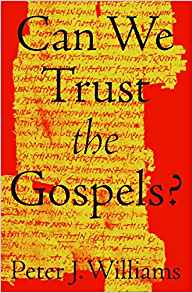Trying to decide what name to choose for a child can be tricky. To help them come up with ideas, expectant parents might turn to the list of most popular baby names. Since 1904, some names have held their popularity in the UK. James, for example, has always been in the top twenty. But other names have dropped out of popularity altogether, such as Hilda, which hasn’t appeared in the top 100 since the 1930s. Other names, like Lily, have made a comeback after dropping out of usage.
When we come to think about the reliability of the Bible, the popularity of baby names might not seem at all relevant. It would never have occurred to me how useful they could be until I read Peter Williams’ book, ‘Can we trust the Gospels?’ The evidence laid out in this book really adds an extra layer of confidence in seeing the Bible as reliable.
I never really questioned the Bible’s reliability until, as a teenager, I was asked to do a talk for our Christian Union on the topic. In my research, I was amazed by how much evidence there was based on the vast number of manuscripts and the archaeological finds. It helped me have confidence in the Bible before I faced any doubts.
In the twenty years since then, plenty of other books (and chapters within apologetic books) have been published to increase our confidence in the Bible. Among them now is Williams’ book, even though he only focusses on the four Gospel accounts. While his chapters take on the topic from different angles, the chapter I was most struck by was the one where he asks, ‘Did the Gospel authors know their stuff?’ In this chapter he reveals how important names are in affirming the reliability of these four Bible books.
The importance of a name
Imagine you were writing a fictional novel set at the end of the 19th century in France. One of the first things you might do is come up with names for your characters. If you wanted to make the story seem as realistic as possible, you’d want to choose authentic names that are in keeping with that period of history and that locality. Being far removed in place and time we might find that difficult.
If the writers of the Gospel accounts were making up the story of Jesus and wanted to make it appear to be authentic, they would need character names that were of the time and place. They wouldn’t be able to ask Google and find out, nor could they even go to their local library for statistical records of names. Yet, as Williams explains, ‘One of the clearest indications of the familiarity of the Gospel writers with the context they are writing about comes in the form of their knowledge of personal names’ (page 64).
Williams utilises some research by scholar Richard Bauckham, who has also produced some brilliant work emphasising the eyewitness nature of the Gospel accounts. Bauckham’s research compiles a list of the most popular Jewish names in historical records. He does this for Jews living in Palestine as well as for Jews living in other parts of the world and while some names cross over, for the most part the Jewish names in Palestine are distinct from the Jewish names in Egypt, Rome or Libya.
The authenticity of a name
Williams highlights the fact that the most popular names in Palestine at the time also accord with the most popular names in the Bible. Simon was by far the most popular male name, followed by Joseph, Lazarus, Judah and John. With the exception of Lazarus, all those names occur for multiple individuals in the New Testament. In fact, the percentage of the nine most popular names within the general population accords very closely with the percentage of New Testament characters that have the nine most popular names. If the Gospel accounts are recording real history, then this is just what you would expect to find.
In our church some of our members share the same name: John, Sian, Brian (or Bryan) and David, to name a few. We sometimes come up with ways of distinguishing one from another! Our surnames are a very easy way to do that, or we sometimes refer to Brian with an ‘I’ or Bryan with a ‘Y’. Likewise, in New Testament times, they had ways of distinguishing one Mary from another, and one Simon from another. So we end up with Simon Peter, Simon the Zealot, Simon the Leper, Simon of Cyrene. For Mary we have Mary Magdalene, Mary the mother of Jesus and Mary the mother of James and John. What the Gospel writers have done is to distinguish the most popular names. However, for the less common names, such as Philip and Bartholomew, they simply record their names, since they do not need distinguishing. What Williams is showing in this is that the Gospel writers were aware, perhaps even without realising it, which names are so popular that they need distinguishing and which names are less common among the general populace.
If the Gospel writers were living at a later time period and if they were from a different geographical location, all this would be impossible to pull off plausibly, especially as the Jewish nature of Palestine was significantly changed by the war resulting in Jerusalem’s destruction in 70AD. What’s more, with four separate Gospel accounts with enough differences to make each one at least partially unique in its source, all four share the same balance of name frequency. In short, they couldn’t have just made it up from a different time period and different place from that in which the Gospels are set.
Williams sums up the chapter thus,
By far the simplest explanation is that the Gospel authors were able to give an authentic pattern of names because they were reliably reporting what people were actually called. Given that names are also hard to remember, the authentic pattern of names in the Gospels suggests that their testimony is of high quality. After all, if they had correctly remembered the less memorable details – the names of individuals – then they should have no difficulty in remembering the more memorable outline of events (page 77).
Many people today take it as given that the Gospel accounts are simply fabrications with perhaps some echoes of truth. But when even the most insignificant details recorded bear all the hallmarks of authenticity, then we should have all the more confidence in the significance of their message.


